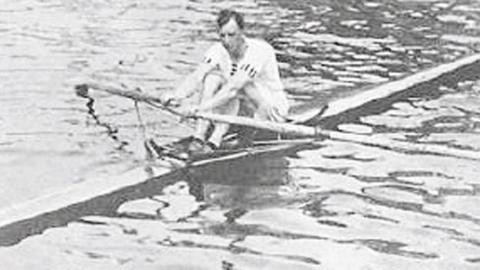These are not normal times in the sporting realm.
The impact of Coronavirus has already led to a spate of cancellations in football, tennis and rugby and the scrapping of such high-profile events as the Australian Grand Prix, the London Marathon and the US Masters.
Yet, while there will be plenty of further turmoil and frantic rescheduling in the months ahead, the scenes of delight and camaraderie at the weekend’s Aberdeen Boat Race demonstrated that people are still making a splash in a range of different activities.
It’s an appropriate phrase, given the remarkable achievements of so many different individuals in and around the water. Long before Aberdeen University’s elite crew surged to success over their counterparts at Robert Gordon University, there have been a raft of competitors who hit the heights whether in rowing, water polo or swimming.
Just consider the likes of Aberdeen-born Angus Gillan, who was one of Scotland’s early stars after the rebirth of the Olympics, and won gold medals at the 1908 and 1912 Games in London and Stockholm.
An important political figure in the development of the Commonwealth and, as an administrator, one of the leading organisers of the 1948 Olympics, Gillan was an incredibly resilient character, who always pushed himself to the nth degree and believed that genius was an infinite capacity for taking pains.
But, even as he attained golden success in the coxless fours in London and the men’s eights in 1912, his efforts were being echoed by others from the north.
George Cornet, for instance, was a redoubtable all-round sportsman from Inverness, who played football, cricket, and excelled in several heavy and track athletics events.
However, it was in water polo where he left an indelible impression when he was part of the British team which struck gold in 1908 and 1912.
He was a formidable specimen; the Stockholm Games report noted that he was 6ft 3in and weighed 15st 7lb and he brought much of his strength and athleticism to the pool.
The sport was thriving at that stage throughout Scotland and Cornet’s Inverness Amateurs team was one of the best ensembles in the country in the early 20th century. He also represented his homeland 17 times between 1897 and 1912 and yet the chances are that precious few people will know his name.
It’s the same with William “Wally” Kinnear, another Olympic champion in the single sculls in 1912 and who was revered as the best in the world in his domain prior to the outbreak of the First World War.
The Laurencekirk-born rower achieved the pursuit’s prestigious “triple crown” in 1911, winning the Wingfield sculls, the Diamond Challenge sculls and the Metropolitan Regatta’s London Cup.
It was nearly another century – in 2007 – before Kinnear was eventually inducted into the Scottish Sports Hall of Fame, but he was one of the highest-regarded competitors of his golden generation and he used to remark he had derived inspiration from compatriots such as Gillan.
More recently, we have witnessed success in rowing for such luminaries as Steve Redgrave and Matthew Pinsent and the exalted Scottish duo, Katherine Grainger and Heather Stanning.
And with the Olympics scheduled for Tokyo later this year – though the exact dates for the event are still a matter of conjecture if they proceed at all – Lewis McCue from Aberdeen is one of the UK’s most highly-regarded rowing coaches.
It is a very serious business these days, with nothing left to chance and elite athletes accustomed to being placed on all kinds of nutritional programmes and individual performance plans as they prepare their campaigns.
But it was in the early days of the Olympics that so many north stars proved to the world they weren’t just messing around in boats.
